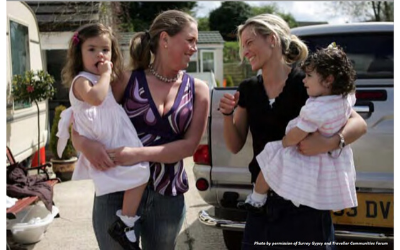
Remarkable efforts by our 0-19 teams to keep vulnerable families safer during COVID-19
Two of the most vulnerable groups in Surrey who have been experiencing especially tough times during lockdown, are the Gypsy Roma Traveller (GRT) community and homeless families. Recognising common problems they share, experienced Health Visitor Lisa Gavin acted swiftly at the start of the COVID-19 pandemic to combine the two teams who normally support these groups in order to strengthen the offer of support.
This joint team have worked together to share COVID-19 messages, keep GRT and homeless families safe and to minimise their risk of spreading the disease. Key to achieving this has been the time the team have spent gaining understanding of the problems these vulnerable groups face. Problems such as poor sanitation. A lack of running water in a caravan makes it difficult to follow the all-important hand washing public health guidance. That’s where the practical support by Lisa’s team of providing buckets to a Traveller site and advice on how best to wash hands while safely keeping dogs and dirt away has been indispensable.
Lisa describes some of the other problems these communities are facing and what she and her team have been doing to help. From solving basic human needs such as getting hold of nappies, baby milk, groceries and clothes to fit rapidly growing babies and toddlers, to weighing babies, carrying out developmental checks, providing advice and signposting to services on contraception and immunisation as well as arranging antenatal appointments and scans.
Lisa Gavin, Clinical Lead Surrey 0-19 Inclusion Health and Gypsy and Traveller Projects, Children and Family Health Surrey said:
“The impact of COVID-19 is that these vulnerable families are more isolated than ever as they are not able access services in the usual way. A large proportion of these communities survive on a cash based way of life and their incomes have disappeared overnight, they don’t necessarily have access to the internet which impacts what they can shop for, they live in cramped conditions which makes social distancing difficult and they suffer from low levels of literacy which makes accessing online or offline information problematic. During lockdown, domestic abuse cases and mental health problems have both been on the rise. I’d like to think we’ve made a small contribution to keeping Surrey safer”.
One of the positives to have come out of this period of time has been how Public Health England (PHE), Surrey County Council and other agencies have joined up to help these communities. For example, when faced with reports of an outbreak on a site with a vulnerable baby who needed to go to hospital, Lisa worked with PHE to get the baby and family tested and PHE ended up testing the whole site.
What’s become even clearer is that these vulnerable communities trust the NHS brand and prefer to speak to the GRT nurses who they don’t see as a threat.
The efforts of Lisa’s team, which includes two health visitors, two community staff nurses, two nursery nurses and another part time member of staff experienced in working with the GRT community, have been warmly welcomed by the communities they serve. Families are grateful that someone cares and have been keen to follow the COVID-19 advice to keep themselves and others safe.
GRT mum of four young children said:
“Thank you so much you’re a life safer, what would have happened to us if you hadn’t come along?”


